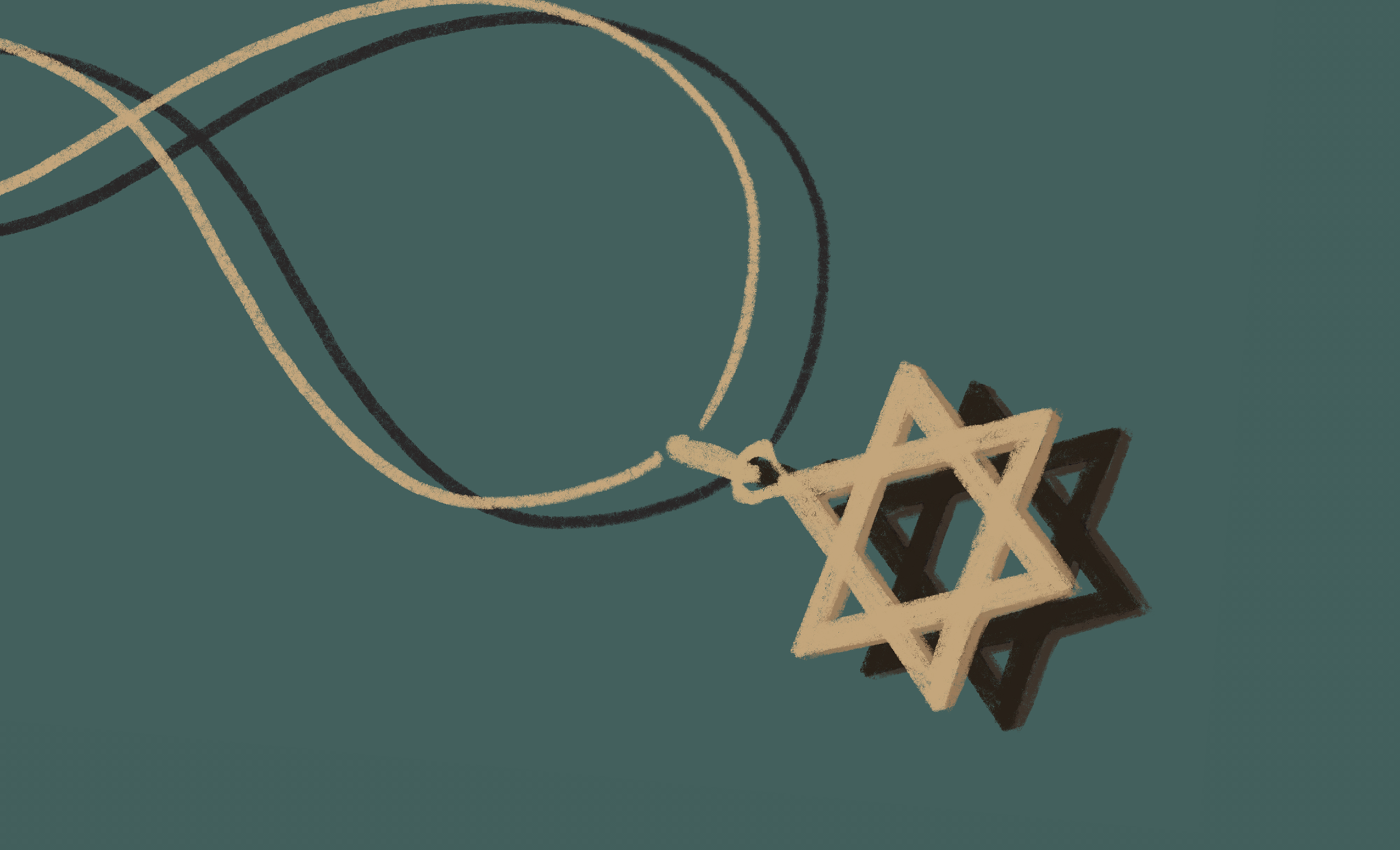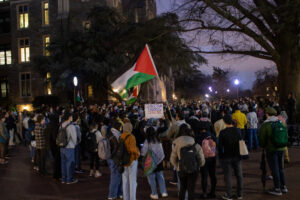Every Friday, Madison Lieberman (CAS ’24) walks to Chabad Georgetown, where she attends Shabbat, a Jewish service celebrating a weekly day of rest. For Lieberman, the ability to connect with her religion has been a lifeline throughout her college experience.
“It’s family,” Lieberman said. “Everybody’s amazing—I met one of my best friends through Chabad.”
At Shabbat services, Lieberman wears a necklace with a Star of David charm. She used to wear it all the time, but recently, she feels that the display of Jewish pride puts her at risk of antisemitism.
“If I’m going out with my friends at 2 o’clock at the bar, I take it off,” Lieberman said. “It’s scary, and it’s not something anybody should have to worry about—Jews or any other group.”
In the months following Hamas’s Oct. 7 attack and Israel’s subsequent invasion of Gaza, Jewish students across the country, including at Georgetown, have reported increased antisemitism. Jewish students who spoke to the Voice shared experiences of being called slurs, being profiled, having fear of speaking about their Judaism, and seeing antisemitic sentiment in online spaces.
The Jewish community has also faced internal challenges and fractures caused by polarizing discussions about Israel and its connection to Jewish identity. These conflicts have led individuals to find solace and meaningful connections in a variety of groups rather than under one umbrella.
Antisemitism has been prevalent on Georgetown’s campus for many years. In January 2023, antisemitic and racist pamphlets were distributed across campus, including within Bayit, Georgetown’s Jewish Living Learning Community. In the same month, students discovered antisemitic graffiti drawn in Darnall Hall following similar incidents in 2022, 2017, 2010, and 2009. A staff member in the School of Foreign Service was placed on leave in November of 2023 after past antisemitic tweets surfaced.
But in January, the threat of antisemitic violence hit much closer to home for many. Two months ago, a Lyft driver allegedly attacked Rabbi Menachem Shemtov—the founder and director of Chabad Georgetown—by striking him several times. Metropolitan Police later arrested the driver, who was charged last month in D.C. Superior Court. According to court documents, authorities believe he was attacked because he is Jewish.
Shemtov and his wife, Racheli, run Georgetown’s chapter of Chabad. Its website describes its mission as “to treat every Jew with love and care and to inspire them to embrace and be proud of their Judaism.”
The attack has not deterred Shemtov from fulfilling that goal.
“What happened was awful, but it doesn’t make me any less proud to be Jewish,” Shemtov told the Voice. “In the face of antisemitism and hatred, we must move forward with pride and ensure that fear doesn’t stop us from living as a proud Jewish community.”
The threat of antisemitism has made physical gatherings more difficult for the Jewish community. The doors to Makom, the campus’s Jewish gathering space, are locked with a deadbolt and several padlocks outside of organized events. While other religious spaces on campus like Dahlgren Chapel remain open to visitors 24/7, given recent antisemitic attacks on other Jewish gathering spaces across the country, Makom’s doors remain closed unless the space is in use for an event.
For Georgetown’s Jewish students, times of increased fear and antisemitism have made community gatherings at Makom, Chabad, and other spaces more important.
The Friday following Oct. 7, Anjali Ofori (CAS ’27) found herself attending Chabad’s Shabbat services alongside her mother, who lives in the area.
“After Oct. 7, my mom was feeling kind of lost,” Ofori said. “We don’t belong to a synagogue back at home, and all of our practicing family is in Philly and New Jersey. So I said, ‘How about you come to Shabbat with me?”
Ofori and her mother ate dinner and talked with other Jews. After Shabbat, the group gave a blessing for Ofori’s grandmother, who had recently passed away.
“It made me happy, because it made my mom happy,” Ofori said. “I’m glad that [Chabad] was able to provide that space for not just students, but also students’ families who were also struggling or feeling lost after the attacks.”
Shemtov said that in recent months he’s seen more students join Chabad’s services.
“The opportunity to be around other individuals who understand what you’re going through on a very deep level is very important,” Shemtov said. “We’re able to come together as a community and feel proud to be Jewish, and feel proud to be Jewish at Georgetown. For many of our students, especially now, that connection is crucial.”
Ofori recently became part of an affinity group for Georgetown’s Jewish students of color through Jewish Life. Being able to connect with other Jews who understand her perspective has made her feel more connected to campus’s Jewish life.
“I often feel distant from Jewish spaces, because I’m a Jew of color, and I’m also not a practicing Jew, but I am Jewish culturally and ethnically,” Ofori said. “It was surprising because there were a lot more Jews of color than I thought there were, which told me that I’m not alone, and that there are people experiencing the same things that I am.”
Other students have found connection in the Jewish Student Association (JSA), Georgetown’s largest Jewish student group. In the past months, student leaders have made an effort to create a safe space for Jewish students to come together, pray, and find joy.
“The Jewish students at Georgetown have really come together to be supportive of one another, and to advocate for one another,” Samantha Yershov (SFS ’25), a JSA board member, said. “Georgetown’s Jewish community has become even stronger over the past few months as we have bonded over shared experiences, perspectives, and values.”
After coming to Georgetown, Ava Schneiberg (CAS ’27) began attending JSA’s events. Soon, it became one of the most important parts of her college experience.
“[JSA] has been one of the best parts of my experience here,” Schneiberg said. “You feel safe there, you feel welcome. It’s been the most welcoming community on campus for me, for sure.”
Amid the rise in antisemitism, she said JSA has become a place of security for students who otherwise feel unsafe on campus.
“[JSA] is a really good resource to lean on, because I think that it’s one of the only places on campus where Jewish students don’t immediately have a target on their backs,” said Schneiberg.
Other Jewish students have found their place in newer organizations.
Last year, several students founded Georgetown’s chapter of Jewish Voice for Peace (JVP), a branch of a larger international organization by the same name. JVP’s website describes itself as “the largest progressive Jewish anti-Zionist organization in the world.” Georgetown’s chapter has been involved in pro-Palestine advocacy, including calling for Georgetown’s divestment from corporations with ties to the Israeli Defense Forces (IDF). The group also holds Shabbat dinners and opportunities for members to gather in faith.
For Lela Tolajian (SFS ’26), one of the group’s founders, the social justice focus of the group matched what she wanted in a campus community.
“Faith organizations that are grounded in social justice advocacy, and the idea of tikkun olam [repairing the world] and tzedakah [charity]—that’s what I love in a Jewish community,” Tolajian said. “To me, JVP is both a political organization and a religious organization.”
Some of JVP’s members have become more involved in the organization following a recent panel hosted by Jewish Life that invited soldiers from the IDF to share their perspectives on Israel’s invasion of Gaza. JVP was among several groups that denounced the event and held protests outside. In the aftermath, the Voice interviewed several students in JVP who expressed feeling unwelcome in other Jewish spaces on campus.
“It was never the intention of JVP to be completely a separate alternative to Jewish Life on campus. Ideally, I would like for JVP and Jewish Life to coexist. You shouldn’t have to choose to go to one Shabbat over the other,” Dylan Taylor (CAS ’26), one of JVP’s founders, said. “Unfortunately, especially in light of the IDF speakers, a lot of my Jewish peers have felt alienated from Jewish Life.”
Recently, as greater international attention has been placed on the Jewish people, long-held debates over what constitutes antisemitism have gained more prominence. Many of the Jewish students who spoke to the Voice said that there have long been debates about the relationship between Judaism as a religion and the Israeli state in the Jewish community.
“To work with a problem, you have to name it and define it, and antisemitism is notoriously difficult to define—or at least there’s a lot of academic disagreement,” Gershon Stein (SFS ’24), a JSA member, said. “It’s important just to think about the definition and the ways in which there’s a differentiation between legitimate criticism of Israel, as an example, and antisemitism, or statements that are grouping Jews together in a problematic way.”
Several Jewish community members stressed the importance of approaching discussions of international affairs in a way that doesn’t conflate the Jewish people with the actions of the state of Israel, which experts say has contributed to the rise in antisemitism since Oct. 7.
“Since October 7, I’ve been really concerned with the conflation of Judaism and the acts of Israel. I think it’s a really dangerous conflation to make, to conflate a religion and a group of people with a nation state,” Miriam Siegel (CAS ’26), a member of JSA and a founder of JVP, said. “The more that those two things are conflated, the more that antisemitism is perpetuated.”
In particular, the use of the terms anti-Zionist and Zionist has been a source of debate for the Jewish community. There is a wide array of ideologies surrounding what constitutes Zionism—defined by Harvard University’s Pluralism Project as the political and cultural belief that Jewish people deserve a Jewish state—and if Zionism is core to Jewish faith.
As national conversations increasingly center the terms Zionist and anti-Zionist, Jews who align with either tenet find themselves on the receiving end of backlash, even from within the Jewish community. Some Jews consider attacks on the state of Israel or protests against Israel to be antisemitic, while others don’t.
“I’ve been called a terrorist sympathizer by Jewish students on this campus. I’ve been told I’m not really Jewish,” Tolajian, a self-defined anti-Zionist Jew, said.
For Tolajian, the term anti-Zionist means that she holds a “moral and ethical opposition to the ongoing settler colonialism and ethnic cleansing of Palestine.”
Other Jewish community members have found that because of their Jewish identity or heritage, others make ill-informed judgments about their political views.
Shemtov shared the story of a Jewish student at Georgetown, who, on their first day on campus, introduced themselves to a group of students. Upon sharing their “Hebrew-sounding” name, another student replied, “Oh, so you’re a Zionist,” and walked away from the student.
Shemtov sees this interaction as an example of how making assumptions about Jews can lead to fearmongering and exclusionary tactics.
“So much is assumed about the Jewish people, the beliefs they hold, and how they feel about different topics,” Shemtov said. “Antisemitism manifests strongly when Jews are excluded from even interacting with non-Jews because of perceptions of [Jewish] people that are, often, based on antisemitism and misinformation.”
As Israel’s invasion of Gaza remains ongoing and antisemitism continues to spike, students emphasized that the Jewish communities they’ve found on campus have become places of solace, mourning, and joy.
“I think Jewish communities are very strong, just based on things that we’ve had to deal with,” Siegel said. “I do think antisemitism plays a role in the way we build our communities—I think in ways it’s brought us closer together, and in ways brought us further apart. But I love being Jewish, and I love being Jewish here.”
Perhaps most importantly, like Siegel, all the students who spoke to the Voice emphasized that they are incredibly proud to be Jewish.
“It’s in these moments when antisemitism spikes that I feel especially proud to be Jewish.” Taylor said. “I feel compelled to wear my Jewishness on my sleeve, and to come together with my Jewish community in solidarity against antisemitism.”






Utter nonsense. There is no ”rising anti-Semitism”, only revulsion at Israel’s barbaric genocide of Palestinians.